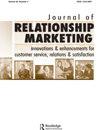A Proposed Model for Consumer-Based Brand Equity Analysis on Social Media Using Data Mining and Social Network Analysis
Q2 Business, Management and Accounting
引用次数: 2
Abstract
ABSTRACT Online social networks have expanded their “virtual borders,” making the Internet more like an environment of social interaction than a business tool. However, even before the emergence and expansion of social media, marketing professionals were interested in identifying consumers' perceptions about brands. Thus, operational models have been proposed to facilitate such a task. Those models, however, can be expensive and inconvenient, since the models use questionnaires for data collection. To help overcome this problem, this article proposes a model for brand equity analysis from the consumer perspective expressed in social networks using opinion mining techniques and social network analysis. The application of the proposed model on data collected from Twitter made it possible to analyze five brand equity dimensions: brand awareness, brand loyalty, perceived sentiment, perceived quality, and brand associations. The results reached by the application of the model show that brand equity can be analyzed from data retrieved from virtual social networks, disclosing how consumers perceive brands in such an environment, without using questionnaires, enabling different brands in different contexts. Those data can be analyzed under both objective and replicable criteria for each of the brand equity elements that make up the model.基于数据挖掘和社交网络分析的社交媒体消费者品牌资产分析模型
摘要在线社交网络扩大了其“虚拟边界”,使互联网更像是一个社交环境,而不是一种商业工具。然而,甚至在社交媒体出现和扩张之前,营销专业人士就对识别消费者对品牌的看法感兴趣。因此,已经提出了促进这项任务的运作模式。然而,这些模型可能既昂贵又不方便,因为这些模型使用问卷进行数据收集。为了帮助克服这个问题,本文提出了一个基于消费者视角的品牌资产分析模型,该模型使用意见挖掘技术和社交网络分析在社交网络中表达。将所提出的模型应用于从推特收集的数据,可以分析五个品牌资产维度:品牌意识、品牌忠诚度、感知情绪、感知质量和品牌关联。该模型的应用结果表明,可以从虚拟社交网络中检索的数据中分析品牌资产,揭示消费者在这样的环境中如何感知品牌,而无需使用问卷,使不同的品牌能够在不同的背景下发挥作用。这些数据可以根据构成模型的每个品牌资产元素的客观和可复制标准进行分析。
本文章由计算机程序翻译,如有差异,请以英文原文为准。
求助全文
约1分钟内获得全文
求助全文
来源期刊

Journal of Relationship Marketing
Business, Management and Accounting-Marketing
CiteScore
10.20
自引率
0.00%
发文量
7
期刊介绍:
The Journal of Relationship Marketing is a quarterly journal that publishes peer-reviewed (double-blind) conceptual and empirical papers of original works that make serious contributions to the understanding and advancement of relationship and marketing theory, research, and practice. This academic journal is interdisciplinary and international in nature. Topics of interest (not limited to): Evolution and life cycle of RM; theoretical and methodological issues in RM; types of RM, networks and strategic alliances; internal communication, quality, trust, commitment, satisfaction, loyalty, and dissolution in RM; applications of RM in different disciplines and industries; international perspectives in RM; RM strategies in services economy, higher education, and e-commerce; RM, technology, and the Web; profitability and RM; case studies and best practices in RM. If you are interested in becoming an ad-hoc reviewer, please e-mail a brief statement indicating your area of expertise and interest along with a copy of your CV.
 求助内容:
求助内容: 应助结果提醒方式:
应助结果提醒方式:


